HR Officer Skills Development and Organisational Learning Report
VerifiedAdded on 2020/12/09
|17
|5114
|309
Report
AI Summary
This report delves into the development of HR officer skills, focusing on the needs of Jane Cambridge at Marks & Spencer. It begins by outlining the essential knowledge, skills, and behaviors required of HR professionals, including administrative management, conceptual knowledge, communication, and problem-solving abilities. A personal skills audit for Jane Cambridge is presented, identifying strengths in IT and communication, while highlighting areas needing improvement, such as database management and advanced communication skills. A professional development plan is then created to address these gaps, including specific opportunities for growth and criteria for judging skill development. The report then differentiates between organizational and individual learning, emphasizing how both contribute to overall business performance. Finally, it explores the contribution of a high-performance workplace to employee engagement and competitive advantage and touches upon performance management approaches that support a high-performance culture.
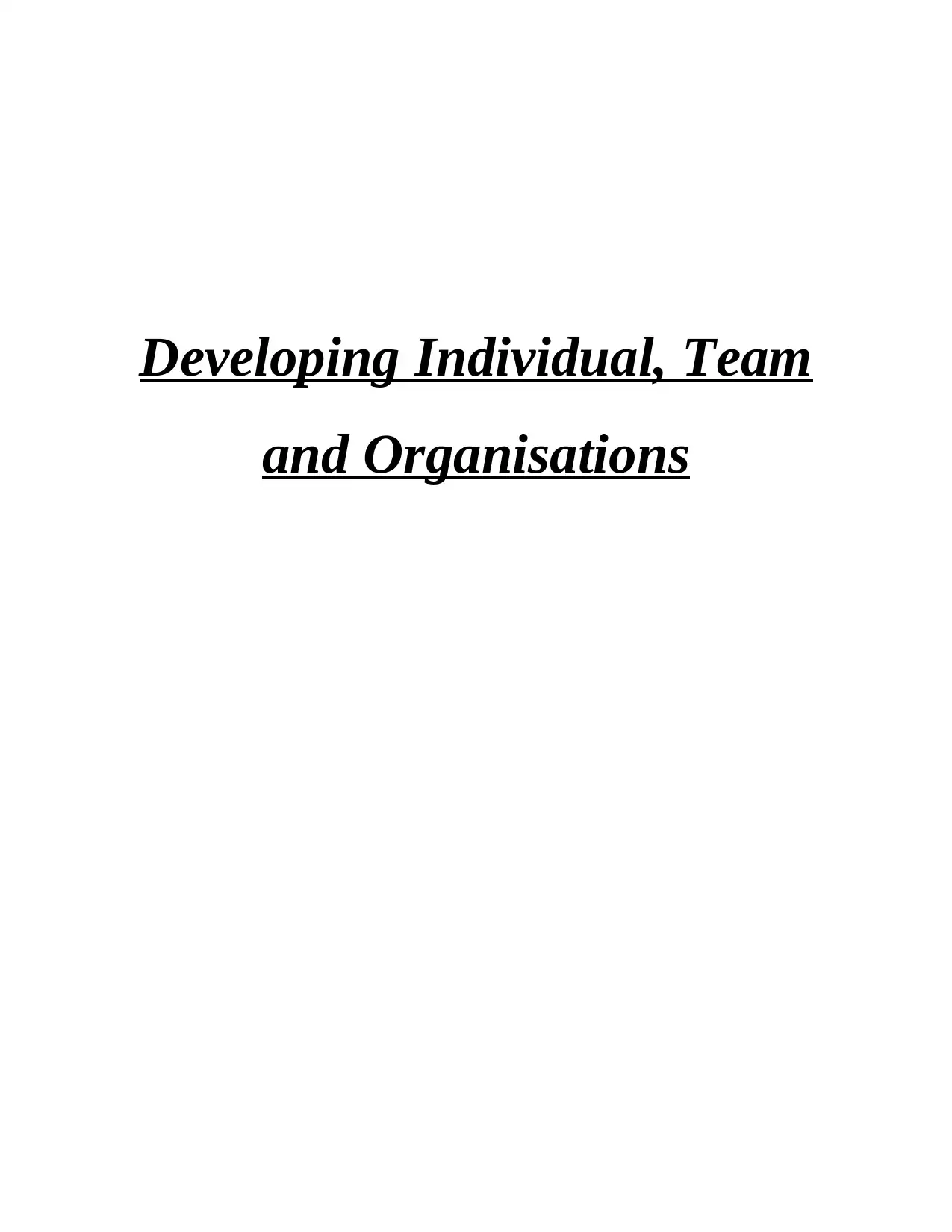
Developing Individual, Team
and Organisations
and Organisations
Paraphrase This Document
Need a fresh take? Get an instant paraphrase of this document with our AI Paraphraser
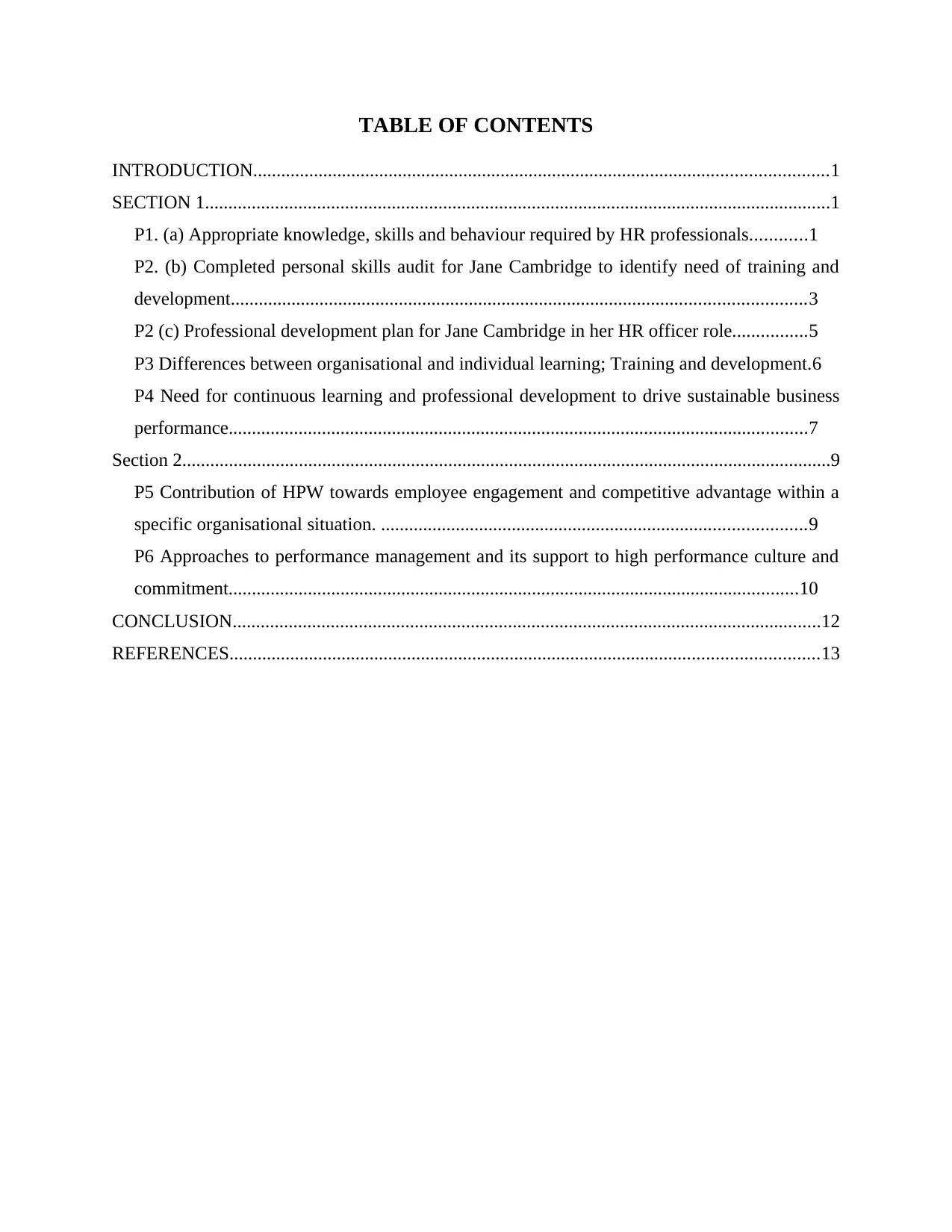
TABLE OF CONTENTS
INTRODUCTION...........................................................................................................................1
SECTION 1......................................................................................................................................1
P1. (a) Appropriate knowledge, skills and behaviour required by HR professionals............1
P2. (b) Completed personal skills audit for Jane Cambridge to identify need of training and
development...........................................................................................................................3
P2 (c) Professional development plan for Jane Cambridge in her HR officer role................5
P3 Differences between organisational and individual learning; Training and development.6
P4 Need for continuous learning and professional development to drive sustainable business
performance............................................................................................................................7
Section 2...........................................................................................................................................9
P5 Contribution of HPW towards employee engagement and competitive advantage within a
specific organisational situation. ...........................................................................................9
P6 Approaches to performance management and its support to high performance culture and
commitment..........................................................................................................................10
CONCLUSION..............................................................................................................................12
REFERENCES..............................................................................................................................13
INTRODUCTION...........................................................................................................................1
SECTION 1......................................................................................................................................1
P1. (a) Appropriate knowledge, skills and behaviour required by HR professionals............1
P2. (b) Completed personal skills audit for Jane Cambridge to identify need of training and
development...........................................................................................................................3
P2 (c) Professional development plan for Jane Cambridge in her HR officer role................5
P3 Differences between organisational and individual learning; Training and development.6
P4 Need for continuous learning and professional development to drive sustainable business
performance............................................................................................................................7
Section 2...........................................................................................................................................9
P5 Contribution of HPW towards employee engagement and competitive advantage within a
specific organisational situation. ...........................................................................................9
P6 Approaches to performance management and its support to high performance culture and
commitment..........................................................................................................................10
CONCLUSION..............................................................................................................................12
REFERENCES..............................................................................................................................13
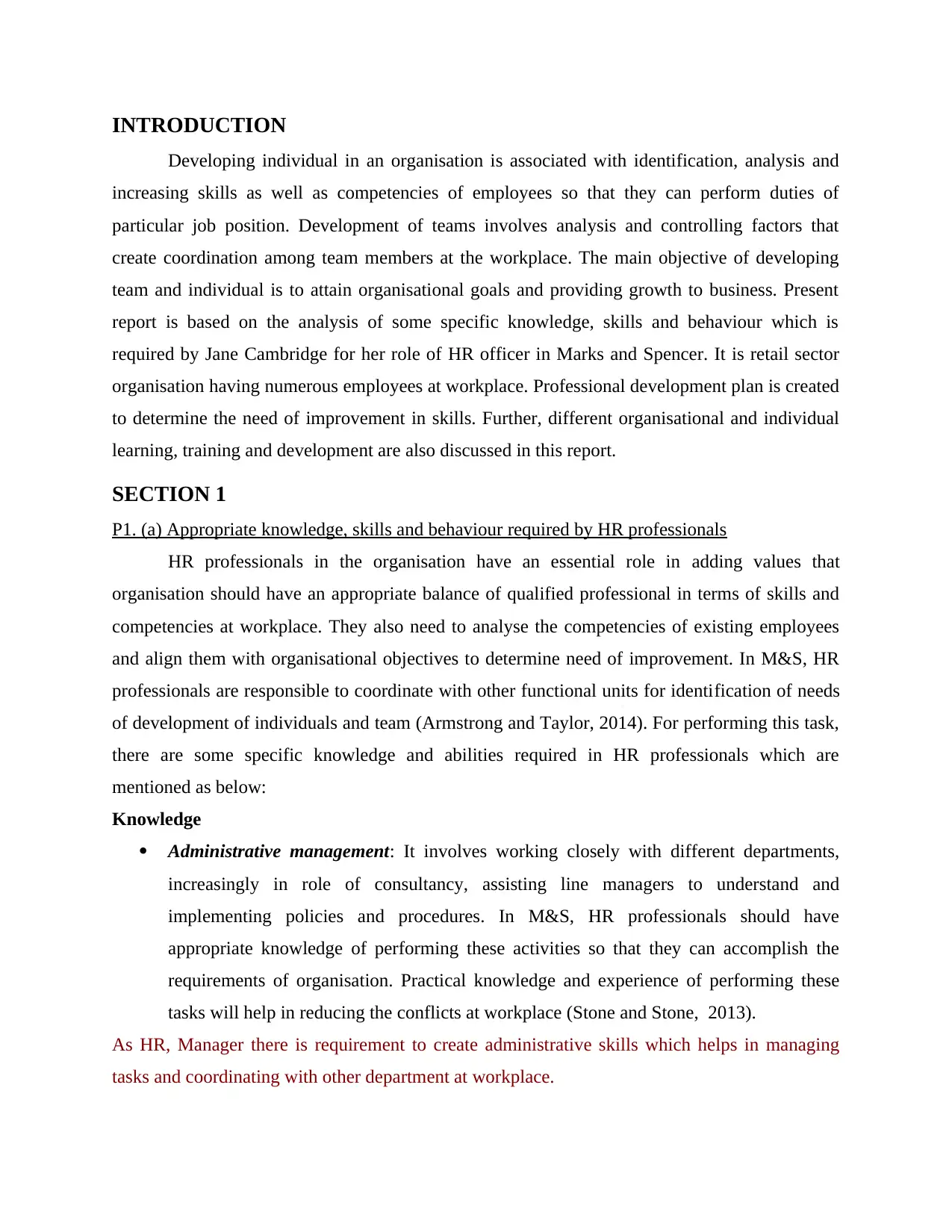
INTRODUCTION
Developing individual in an organisation is associated with identification, analysis and
increasing skills as well as competencies of employees so that they can perform duties of
particular job position. Development of teams involves analysis and controlling factors that
create coordination among team members at the workplace. The main objective of developing
team and individual is to attain organisational goals and providing growth to business. Present
report is based on the analysis of some specific knowledge, skills and behaviour which is
required by Jane Cambridge for her role of HR officer in Marks and Spencer. It is retail sector
organisation having numerous employees at workplace. Professional development plan is created
to determine the need of improvement in skills. Further, different organisational and individual
learning, training and development are also discussed in this report.
SECTION 1
P1. (a) Appropriate knowledge, skills and behaviour required by HR professionals
HR professionals in the organisation have an essential role in adding values that
organisation should have an appropriate balance of qualified professional in terms of skills and
competencies at workplace. They also need to analyse the competencies of existing employees
and align them with organisational objectives to determine need of improvement. In M&S, HR
professionals are responsible to coordinate with other functional units for identification of needs
of development of individuals and team (Armstrong and Taylor, 2014). For performing this task,
there are some specific knowledge and abilities required in HR professionals which are
mentioned as below:
Knowledge
Administrative management: It involves working closely with different departments,
increasingly in role of consultancy, assisting line managers to understand and
implementing policies and procedures. In M&S, HR professionals should have
appropriate knowledge of performing these activities so that they can accomplish the
requirements of organisation. Practical knowledge and experience of performing these
tasks will help in reducing the conflicts at workplace (Stone and Stone, 2013).
As HR, Manager there is requirement to create administrative skills which helps in managing
tasks and coordinating with other department at workplace.
Developing individual in an organisation is associated with identification, analysis and
increasing skills as well as competencies of employees so that they can perform duties of
particular job position. Development of teams involves analysis and controlling factors that
create coordination among team members at the workplace. The main objective of developing
team and individual is to attain organisational goals and providing growth to business. Present
report is based on the analysis of some specific knowledge, skills and behaviour which is
required by Jane Cambridge for her role of HR officer in Marks and Spencer. It is retail sector
organisation having numerous employees at workplace. Professional development plan is created
to determine the need of improvement in skills. Further, different organisational and individual
learning, training and development are also discussed in this report.
SECTION 1
P1. (a) Appropriate knowledge, skills and behaviour required by HR professionals
HR professionals in the organisation have an essential role in adding values that
organisation should have an appropriate balance of qualified professional in terms of skills and
competencies at workplace. They also need to analyse the competencies of existing employees
and align them with organisational objectives to determine need of improvement. In M&S, HR
professionals are responsible to coordinate with other functional units for identification of needs
of development of individuals and team (Armstrong and Taylor, 2014). For performing this task,
there are some specific knowledge and abilities required in HR professionals which are
mentioned as below:
Knowledge
Administrative management: It involves working closely with different departments,
increasingly in role of consultancy, assisting line managers to understand and
implementing policies and procedures. In M&S, HR professionals should have
appropriate knowledge of performing these activities so that they can accomplish the
requirements of organisation. Practical knowledge and experience of performing these
tasks will help in reducing the conflicts at workplace (Stone and Stone, 2013).
As HR, Manager there is requirement to create administrative skills which helps in managing
tasks and coordinating with other department at workplace.
⊘ This is a preview!⊘
Do you want full access?
Subscribe today to unlock all pages.

Trusted by 1+ million students worldwide
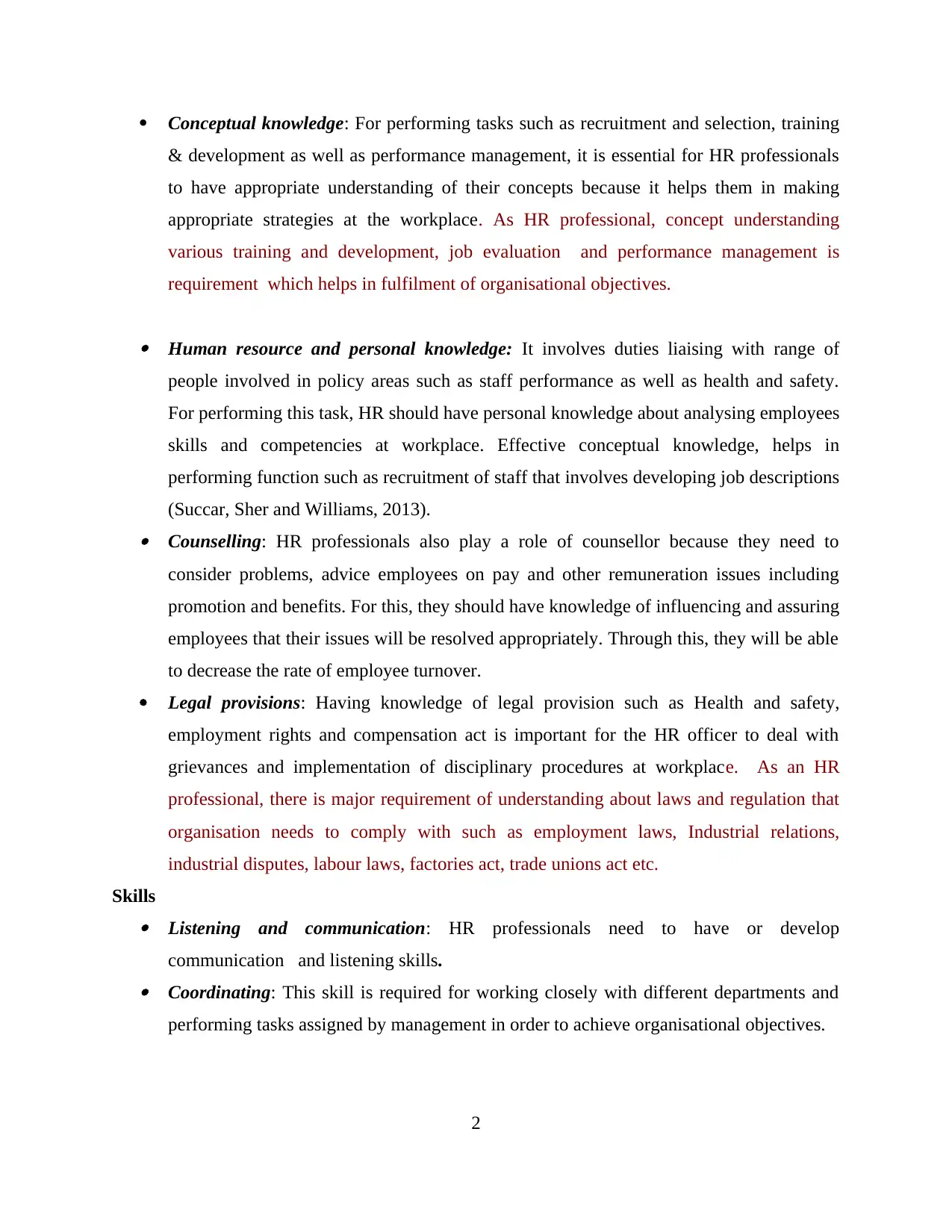
Conceptual knowledge: For performing tasks such as recruitment and selection, training
& development as well as performance management, it is essential for HR professionals
to have appropriate understanding of their concepts because it helps them in making
appropriate strategies at the workplace. As HR professional, concept understanding
various training and development, job evaluation and performance management is
requirement which helps in fulfilment of organisational objectives.
Human resource and personal knowledge: It involves duties liaising with range of
people involved in policy areas such as staff performance as well as health and safety.
For performing this task, HR should have personal knowledge about analysing employees
skills and competencies at workplace. Effective conceptual knowledge, helps in
performing function such as recruitment of staff that involves developing job descriptions
(Succar, Sher and Williams, 2013). Counselling: HR professionals also play a role of counsellor because they need to
consider problems, advice employees on pay and other remuneration issues including
promotion and benefits. For this, they should have knowledge of influencing and assuring
employees that their issues will be resolved appropriately. Through this, they will be able
to decrease the rate of employee turnover.
Legal provisions: Having knowledge of legal provision such as Health and safety,
employment rights and compensation act is important for the HR officer to deal with
grievances and implementation of disciplinary procedures at workplace. As an HR
professional, there is major requirement of understanding about laws and regulation that
organisation needs to comply with such as employment laws, Industrial relations,
industrial disputes, labour laws, factories act, trade unions act etc.
Skills Listening and communication: HR professionals need to have or develop
communication and listening skills. Coordinating: This skill is required for working closely with different departments and
performing tasks assigned by management in order to achieve organisational objectives.
2
& development as well as performance management, it is essential for HR professionals
to have appropriate understanding of their concepts because it helps them in making
appropriate strategies at the workplace. As HR professional, concept understanding
various training and development, job evaluation and performance management is
requirement which helps in fulfilment of organisational objectives.
Human resource and personal knowledge: It involves duties liaising with range of
people involved in policy areas such as staff performance as well as health and safety.
For performing this task, HR should have personal knowledge about analysing employees
skills and competencies at workplace. Effective conceptual knowledge, helps in
performing function such as recruitment of staff that involves developing job descriptions
(Succar, Sher and Williams, 2013). Counselling: HR professionals also play a role of counsellor because they need to
consider problems, advice employees on pay and other remuneration issues including
promotion and benefits. For this, they should have knowledge of influencing and assuring
employees that their issues will be resolved appropriately. Through this, they will be able
to decrease the rate of employee turnover.
Legal provisions: Having knowledge of legal provision such as Health and safety,
employment rights and compensation act is important for the HR officer to deal with
grievances and implementation of disciplinary procedures at workplace. As an HR
professional, there is major requirement of understanding about laws and regulation that
organisation needs to comply with such as employment laws, Industrial relations,
industrial disputes, labour laws, factories act, trade unions act etc.
Skills Listening and communication: HR professionals need to have or develop
communication and listening skills. Coordinating: This skill is required for working closely with different departments and
performing tasks assigned by management in order to achieve organisational objectives.
2
Paraphrase This Document
Need a fresh take? Get an instant paraphrase of this document with our AI Paraphraser
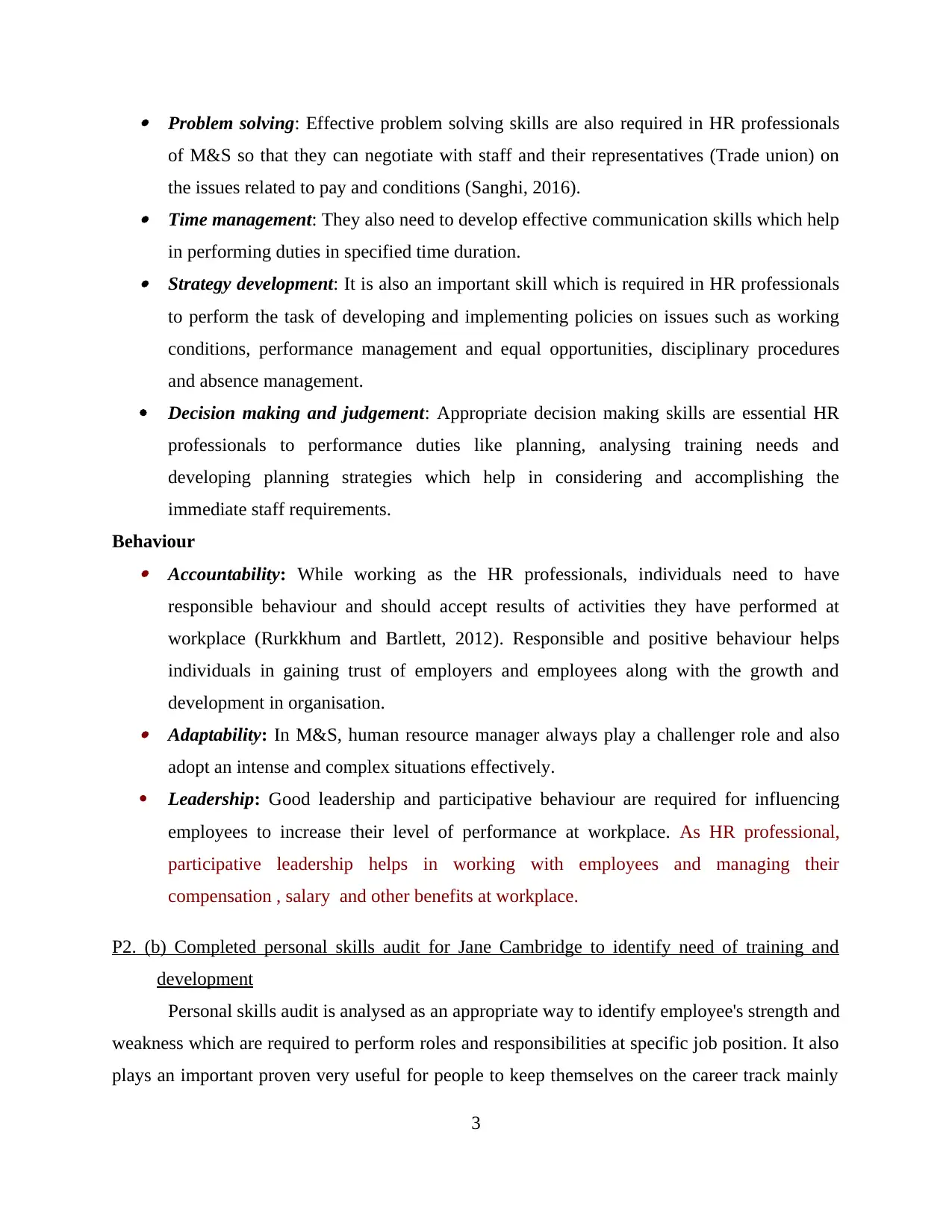
Problem solving: Effective problem solving skills are also required in HR professionals
of M&S so that they can negotiate with staff and their representatives (Trade union) on
the issues related to pay and conditions (Sanghi, 2016). Time management: They also need to develop effective communication skills which help
in performing duties in specified time duration. Strategy development: It is also an important skill which is required in HR professionals
to perform the task of developing and implementing policies on issues such as working
conditions, performance management and equal opportunities, disciplinary procedures
and absence management.
Decision making and judgement: Appropriate decision making skills are essential HR
professionals to performance duties like planning, analysing training needs and
developing planning strategies which help in considering and accomplishing the
immediate staff requirements.
Behaviour Accountability: While working as the HR professionals, individuals need to have
responsible behaviour and should accept results of activities they have performed at
workplace (Rurkkhum and Bartlett, 2012). Responsible and positive behaviour helps
individuals in gaining trust of employers and employees along with the growth and
development in organisation. Adaptability: In M&S, human resource manager always play a challenger role and also
adopt an intense and complex situations effectively.
Leadership: Good leadership and participative behaviour are required for influencing
employees to increase their level of performance at workplace. As HR professional,
participative leadership helps in working with employees and managing their
compensation , salary and other benefits at workplace.
P2. (b) Completed personal skills audit for Jane Cambridge to identify need of training and
development
Personal skills audit is analysed as an appropriate way to identify employee's strength and
weakness which are required to perform roles and responsibilities at specific job position. It also
plays an important proven very useful for people to keep themselves on the career track mainly
3
of M&S so that they can negotiate with staff and their representatives (Trade union) on
the issues related to pay and conditions (Sanghi, 2016). Time management: They also need to develop effective communication skills which help
in performing duties in specified time duration. Strategy development: It is also an important skill which is required in HR professionals
to perform the task of developing and implementing policies on issues such as working
conditions, performance management and equal opportunities, disciplinary procedures
and absence management.
Decision making and judgement: Appropriate decision making skills are essential HR
professionals to performance duties like planning, analysing training needs and
developing planning strategies which help in considering and accomplishing the
immediate staff requirements.
Behaviour Accountability: While working as the HR professionals, individuals need to have
responsible behaviour and should accept results of activities they have performed at
workplace (Rurkkhum and Bartlett, 2012). Responsible and positive behaviour helps
individuals in gaining trust of employers and employees along with the growth and
development in organisation. Adaptability: In M&S, human resource manager always play a challenger role and also
adopt an intense and complex situations effectively.
Leadership: Good leadership and participative behaviour are required for influencing
employees to increase their level of performance at workplace. As HR professional,
participative leadership helps in working with employees and managing their
compensation , salary and other benefits at workplace.
P2. (b) Completed personal skills audit for Jane Cambridge to identify need of training and
development
Personal skills audit is analysed as an appropriate way to identify employee's strength and
weakness which are required to perform roles and responsibilities at specific job position. It also
plays an important proven very useful for people to keep themselves on the career track mainly
3
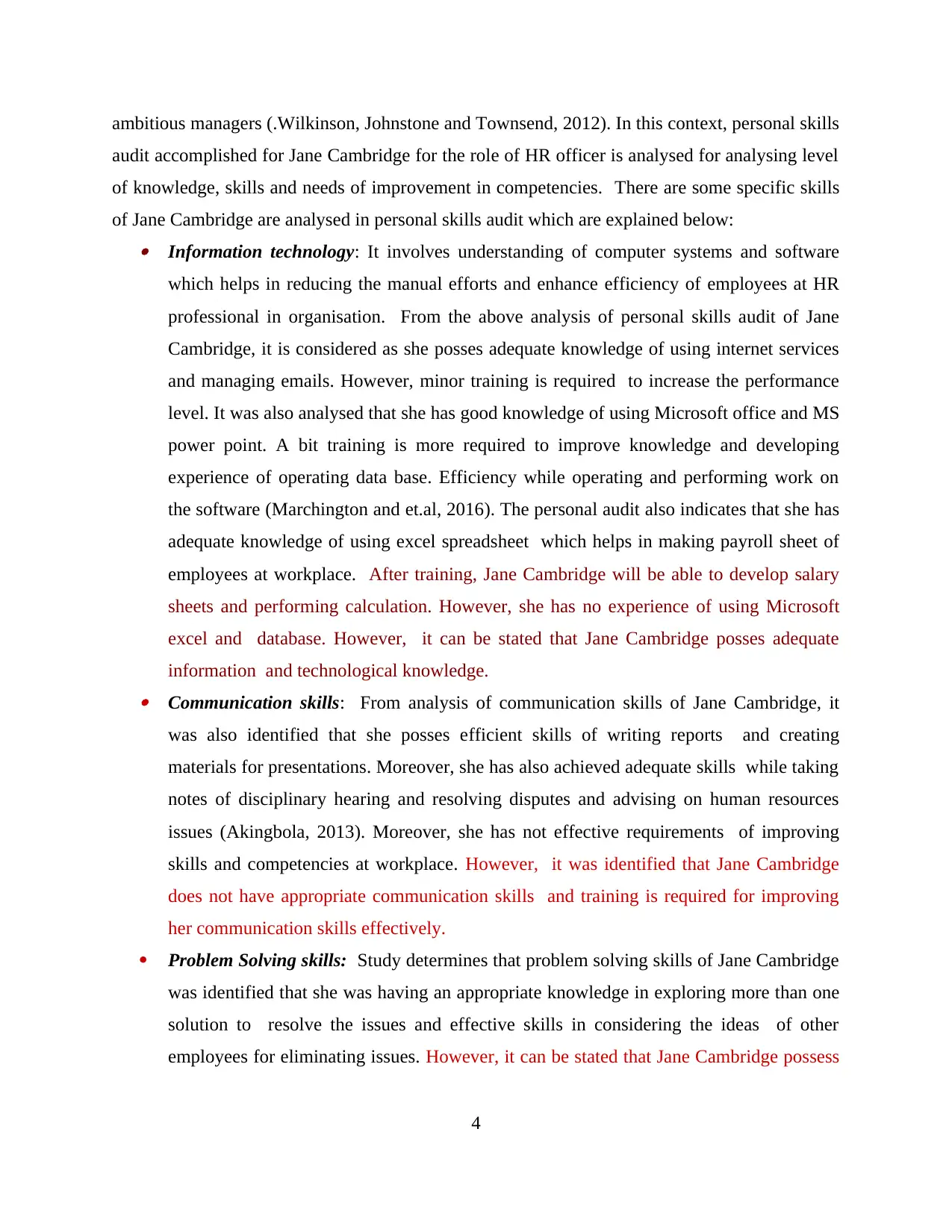
ambitious managers (.Wilkinson, Johnstone and Townsend, 2012). In this context, personal skills
audit accomplished for Jane Cambridge for the role of HR officer is analysed for analysing level
of knowledge, skills and needs of improvement in competencies. There are some specific skills
of Jane Cambridge are analysed in personal skills audit which are explained below: Information technology: It involves understanding of computer systems and software
which helps in reducing the manual efforts and enhance efficiency of employees at HR
professional in organisation. From the above analysis of personal skills audit of Jane
Cambridge, it is considered as she posses adequate knowledge of using internet services
and managing emails. However, minor training is required to increase the performance
level. It was also analysed that she has good knowledge of using Microsoft office and MS
power point. A bit training is more required to improve knowledge and developing
experience of operating data base. Efficiency while operating and performing work on
the software (Marchington and et.al, 2016). The personal audit also indicates that she has
adequate knowledge of using excel spreadsheet which helps in making payroll sheet of
employees at workplace. After training, Jane Cambridge will be able to develop salary
sheets and performing calculation. However, she has no experience of using Microsoft
excel and database. However, it can be stated that Jane Cambridge posses adequate
information and technological knowledge. Communication skills: From analysis of communication skills of Jane Cambridge, it
was also identified that she posses efficient skills of writing reports and creating
materials for presentations. Moreover, she has also achieved adequate skills while taking
notes of disciplinary hearing and resolving disputes and advising on human resources
issues (Akingbola, 2013). Moreover, she has not effective requirements of improving
skills and competencies at workplace. However, it was identified that Jane Cambridge
does not have appropriate communication skills and training is required for improving
her communication skills effectively.
Problem Solving skills: Study determines that problem solving skills of Jane Cambridge
was identified that she was having an appropriate knowledge in exploring more than one
solution to resolve the issues and effective skills in considering the ideas of other
employees for eliminating issues. However, it can be stated that Jane Cambridge possess
4
audit accomplished for Jane Cambridge for the role of HR officer is analysed for analysing level
of knowledge, skills and needs of improvement in competencies. There are some specific skills
of Jane Cambridge are analysed in personal skills audit which are explained below: Information technology: It involves understanding of computer systems and software
which helps in reducing the manual efforts and enhance efficiency of employees at HR
professional in organisation. From the above analysis of personal skills audit of Jane
Cambridge, it is considered as she posses adequate knowledge of using internet services
and managing emails. However, minor training is required to increase the performance
level. It was also analysed that she has good knowledge of using Microsoft office and MS
power point. A bit training is more required to improve knowledge and developing
experience of operating data base. Efficiency while operating and performing work on
the software (Marchington and et.al, 2016). The personal audit also indicates that she has
adequate knowledge of using excel spreadsheet which helps in making payroll sheet of
employees at workplace. After training, Jane Cambridge will be able to develop salary
sheets and performing calculation. However, she has no experience of using Microsoft
excel and database. However, it can be stated that Jane Cambridge posses adequate
information and technological knowledge. Communication skills: From analysis of communication skills of Jane Cambridge, it
was also identified that she posses efficient skills of writing reports and creating
materials for presentations. Moreover, she has also achieved adequate skills while taking
notes of disciplinary hearing and resolving disputes and advising on human resources
issues (Akingbola, 2013). Moreover, she has not effective requirements of improving
skills and competencies at workplace. However, it was identified that Jane Cambridge
does not have appropriate communication skills and training is required for improving
her communication skills effectively.
Problem Solving skills: Study determines that problem solving skills of Jane Cambridge
was identified that she was having an appropriate knowledge in exploring more than one
solution to resolve the issues and effective skills in considering the ideas of other
employees for eliminating issues. However, it can be stated that Jane Cambridge possess
4
⊘ This is a preview!⊘
Do you want full access?
Subscribe today to unlock all pages.

Trusted by 1+ million students worldwide
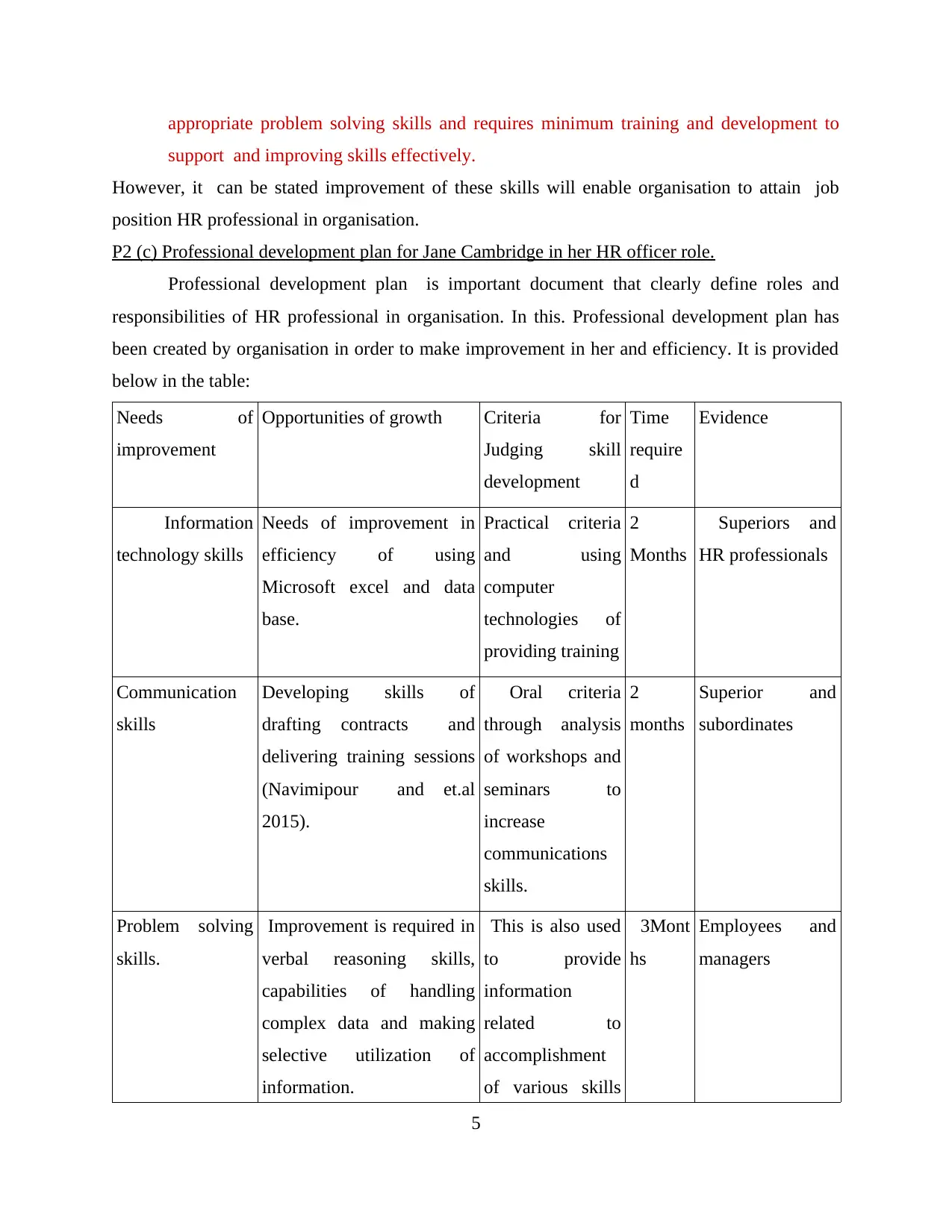
appropriate problem solving skills and requires minimum training and development to
support and improving skills effectively.
However, it can be stated improvement of these skills will enable organisation to attain job
position HR professional in organisation.
P2 (c) Professional development plan for Jane Cambridge in her HR officer role.
Professional development plan is important document that clearly define roles and
responsibilities of HR professional in organisation. In this. Professional development plan has
been created by organisation in order to make improvement in her and efficiency. It is provided
below in the table:
Needs of
improvement
Opportunities of growth Criteria for
Judging skill
development
Time
require
d
Evidence
Information
technology skills
Needs of improvement in
efficiency of using
Microsoft excel and data
base.
Practical criteria
and using
computer
technologies of
providing training
2
Months
Superiors and
HR professionals
Communication
skills
Developing skills of
drafting contracts and
delivering training sessions
(Navimipour and et.al
2015).
Oral criteria
through analysis
of workshops and
seminars to
increase
communications
skills.
2
months
Superior and
subordinates
Problem solving
skills.
Improvement is required in
verbal reasoning skills,
capabilities of handling
complex data and making
selective utilization of
information.
This is also used
to provide
information
related to
accomplishment
of various skills
3Mont
hs
Employees and
managers
5
support and improving skills effectively.
However, it can be stated improvement of these skills will enable organisation to attain job
position HR professional in organisation.
P2 (c) Professional development plan for Jane Cambridge in her HR officer role.
Professional development plan is important document that clearly define roles and
responsibilities of HR professional in organisation. In this. Professional development plan has
been created by organisation in order to make improvement in her and efficiency. It is provided
below in the table:
Needs of
improvement
Opportunities of growth Criteria for
Judging skill
development
Time
require
d
Evidence
Information
technology skills
Needs of improvement in
efficiency of using
Microsoft excel and data
base.
Practical criteria
and using
computer
technologies of
providing training
2
Months
Superiors and
HR professionals
Communication
skills
Developing skills of
drafting contracts and
delivering training sessions
(Navimipour and et.al
2015).
Oral criteria
through analysis
of workshops and
seminars to
increase
communications
skills.
2
months
Superior and
subordinates
Problem solving
skills.
Improvement is required in
verbal reasoning skills,
capabilities of handling
complex data and making
selective utilization of
information.
This is also used
to provide
information
related to
accomplishment
of various skills
3Mont
hs
Employees and
managers
5
Paraphrase This Document
Need a fresh take? Get an instant paraphrase of this document with our AI Paraphraser
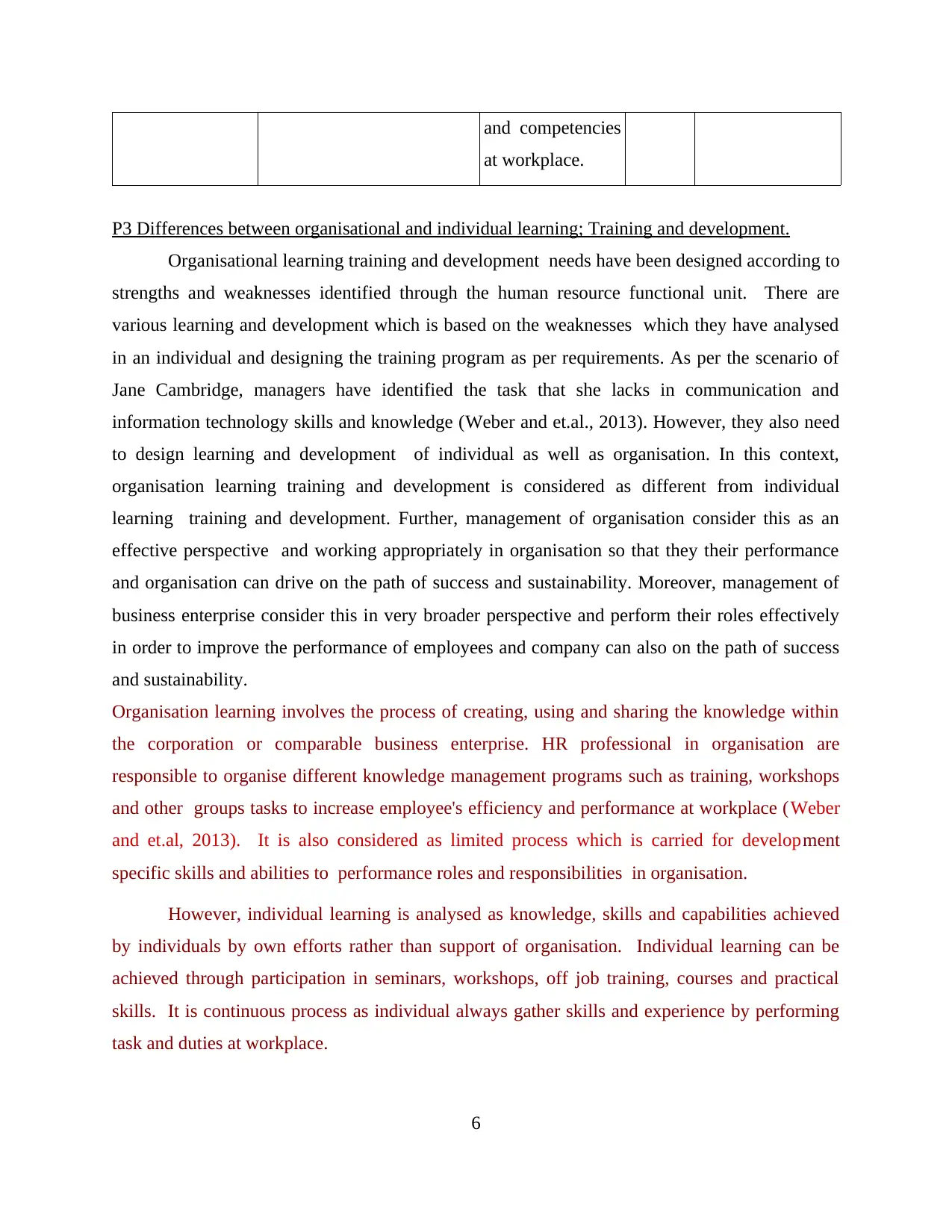
and competencies
at workplace.
P3 Differences between organisational and individual learning; Training and development.
Organisational learning training and development needs have been designed according to
strengths and weaknesses identified through the human resource functional unit. There are
various learning and development which is based on the weaknesses which they have analysed
in an individual and designing the training program as per requirements. As per the scenario of
Jane Cambridge, managers have identified the task that she lacks in communication and
information technology skills and knowledge (Weber and et.al., 2013). However, they also need
to design learning and development of individual as well as organisation. In this context,
organisation learning training and development is considered as different from individual
learning training and development. Further, management of organisation consider this as an
effective perspective and working appropriately in organisation so that they their performance
and organisation can drive on the path of success and sustainability. Moreover, management of
business enterprise consider this in very broader perspective and perform their roles effectively
in order to improve the performance of employees and company can also on the path of success
and sustainability.
Organisation learning involves the process of creating, using and sharing the knowledge within
the corporation or comparable business enterprise. HR professional in organisation are
responsible to organise different knowledge management programs such as training, workshops
and other groups tasks to increase employee's efficiency and performance at workplace (Weber
and et.al, 2013). It is also considered as limited process which is carried for development
specific skills and abilities to performance roles and responsibilities in organisation.
However, individual learning is analysed as knowledge, skills and capabilities achieved
by individuals by own efforts rather than support of organisation. Individual learning can be
achieved through participation in seminars, workshops, off job training, courses and practical
skills. It is continuous process as individual always gather skills and experience by performing
task and duties at workplace.
6
at workplace.
P3 Differences between organisational and individual learning; Training and development.
Organisational learning training and development needs have been designed according to
strengths and weaknesses identified through the human resource functional unit. There are
various learning and development which is based on the weaknesses which they have analysed
in an individual and designing the training program as per requirements. As per the scenario of
Jane Cambridge, managers have identified the task that she lacks in communication and
information technology skills and knowledge (Weber and et.al., 2013). However, they also need
to design learning and development of individual as well as organisation. In this context,
organisation learning training and development is considered as different from individual
learning training and development. Further, management of organisation consider this as an
effective perspective and working appropriately in organisation so that they their performance
and organisation can drive on the path of success and sustainability. Moreover, management of
business enterprise consider this in very broader perspective and perform their roles effectively
in order to improve the performance of employees and company can also on the path of success
and sustainability.
Organisation learning involves the process of creating, using and sharing the knowledge within
the corporation or comparable business enterprise. HR professional in organisation are
responsible to organise different knowledge management programs such as training, workshops
and other groups tasks to increase employee's efficiency and performance at workplace (Weber
and et.al, 2013). It is also considered as limited process which is carried for development
specific skills and abilities to performance roles and responsibilities in organisation.
However, individual learning is analysed as knowledge, skills and capabilities achieved
by individuals by own efforts rather than support of organisation. Individual learning can be
achieved through participation in seminars, workshops, off job training, courses and practical
skills. It is continuous process as individual always gather skills and experience by performing
task and duties at workplace.
6
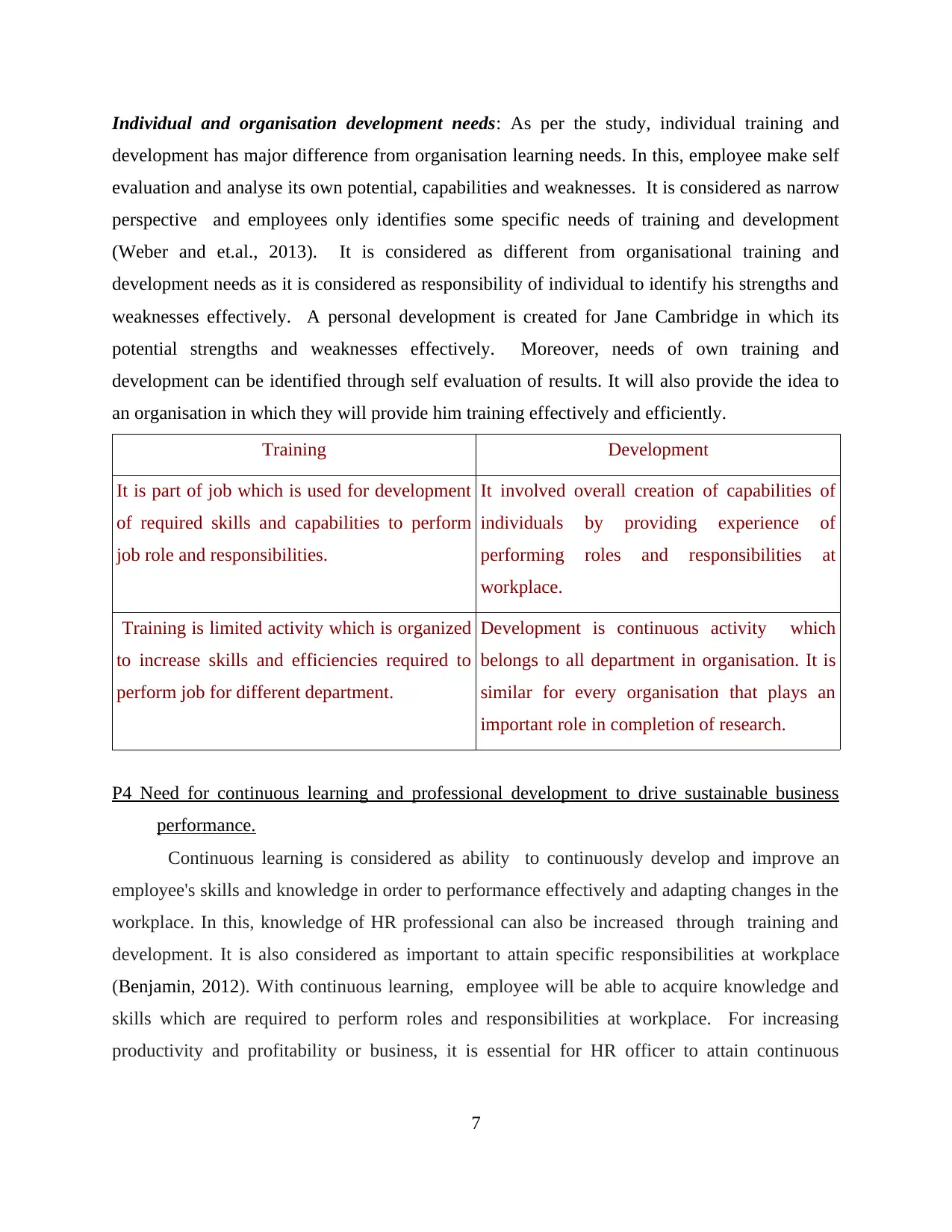
Individual and organisation development needs: As per the study, individual training and
development has major difference from organisation learning needs. In this, employee make self
evaluation and analyse its own potential, capabilities and weaknesses. It is considered as narrow
perspective and employees only identifies some specific needs of training and development
(Weber and et.al., 2013). It is considered as different from organisational training and
development needs as it is considered as responsibility of individual to identify his strengths and
weaknesses effectively. A personal development is created for Jane Cambridge in which its
potential strengths and weaknesses effectively. Moreover, needs of own training and
development can be identified through self evaluation of results. It will also provide the idea to
an organisation in which they will provide him training effectively and efficiently.
Training Development
It is part of job which is used for development
of required skills and capabilities to perform
job role and responsibilities.
It involved overall creation of capabilities of
individuals by providing experience of
performing roles and responsibilities at
workplace.
Training is limited activity which is organized
to increase skills and efficiencies required to
perform job for different department.
Development is continuous activity which
belongs to all department in organisation. It is
similar for every organisation that plays an
important role in completion of research.
P4 Need for continuous learning and professional development to drive sustainable business
performance.
Continuous learning is considered as ability to continuously develop and improve an
employee's skills and knowledge in order to performance effectively and adapting changes in the
workplace. In this, knowledge of HR professional can also be increased through training and
development. It is also considered as important to attain specific responsibilities at workplace
(Benjamin, 2012). With continuous learning, employee will be able to acquire knowledge and
skills which are required to perform roles and responsibilities at workplace. For increasing
productivity and profitability or business, it is essential for HR officer to attain continuous
7
development has major difference from organisation learning needs. In this, employee make self
evaluation and analyse its own potential, capabilities and weaknesses. It is considered as narrow
perspective and employees only identifies some specific needs of training and development
(Weber and et.al., 2013). It is considered as different from organisational training and
development needs as it is considered as responsibility of individual to identify his strengths and
weaknesses effectively. A personal development is created for Jane Cambridge in which its
potential strengths and weaknesses effectively. Moreover, needs of own training and
development can be identified through self evaluation of results. It will also provide the idea to
an organisation in which they will provide him training effectively and efficiently.
Training Development
It is part of job which is used for development
of required skills and capabilities to perform
job role and responsibilities.
It involved overall creation of capabilities of
individuals by providing experience of
performing roles and responsibilities at
workplace.
Training is limited activity which is organized
to increase skills and efficiencies required to
perform job for different department.
Development is continuous activity which
belongs to all department in organisation. It is
similar for every organisation that plays an
important role in completion of research.
P4 Need for continuous learning and professional development to drive sustainable business
performance.
Continuous learning is considered as ability to continuously develop and improve an
employee's skills and knowledge in order to performance effectively and adapting changes in the
workplace. In this, knowledge of HR professional can also be increased through training and
development. It is also considered as important to attain specific responsibilities at workplace
(Benjamin, 2012). With continuous learning, employee will be able to acquire knowledge and
skills which are required to perform roles and responsibilities at workplace. For increasing
productivity and profitability or business, it is essential for HR officer to attain continuous
7
⊘ This is a preview!⊘
Do you want full access?
Subscribe today to unlock all pages.

Trusted by 1+ million students worldwide
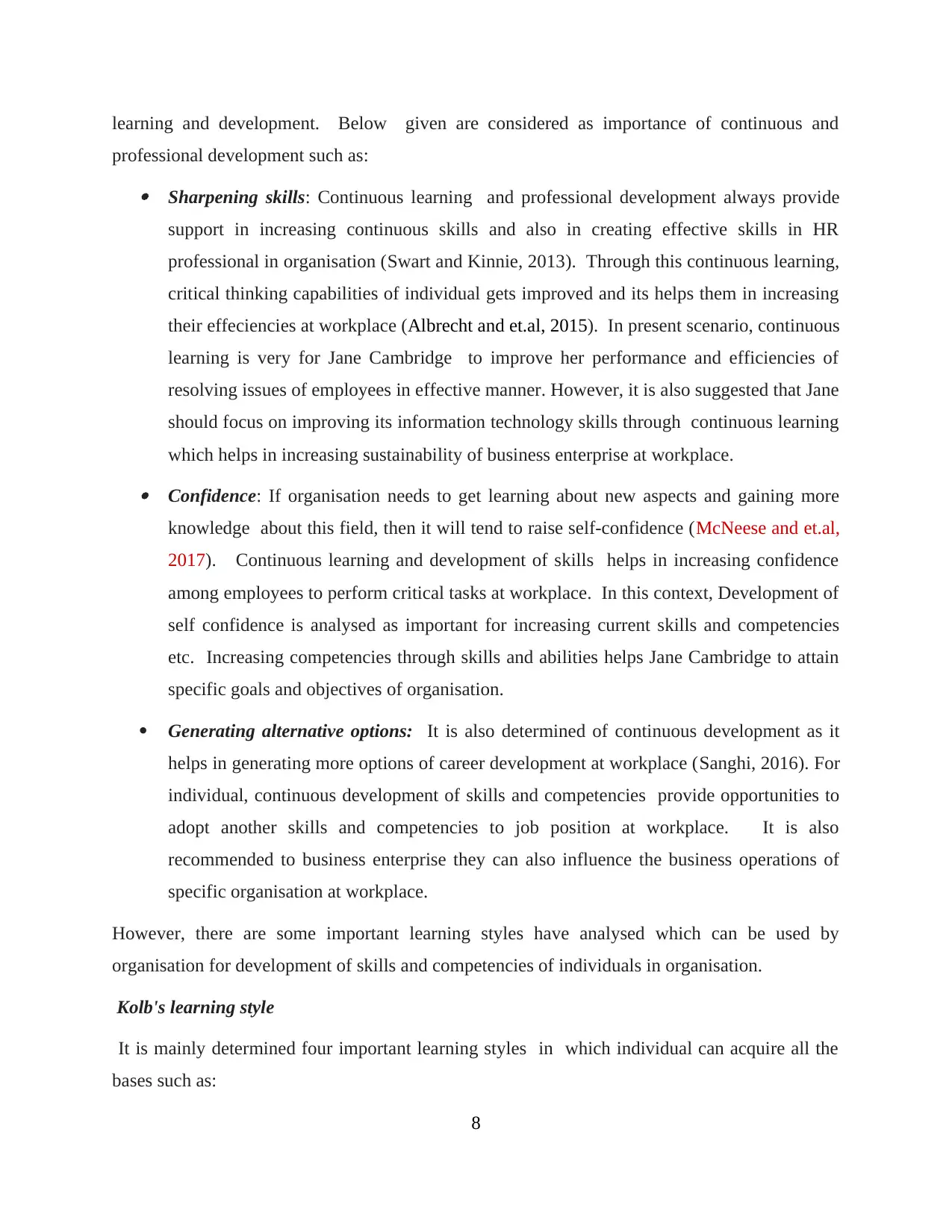
learning and development. Below given are considered as importance of continuous and
professional development such as: Sharpening skills: Continuous learning and professional development always provide
support in increasing continuous skills and also in creating effective skills in HR
professional in organisation (Swart and Kinnie, 2013). Through this continuous learning,
critical thinking capabilities of individual gets improved and its helps them in increasing
their effeciencies at workplace (Albrecht and et.al, 2015). In present scenario, continuous
learning is very for Jane Cambridge to improve her performance and efficiencies of
resolving issues of employees in effective manner. However, it is also suggested that Jane
should focus on improving its information technology skills through continuous learning
which helps in increasing sustainability of business enterprise at workplace. Confidence: If organisation needs to get learning about new aspects and gaining more
knowledge about this field, then it will tend to raise self-confidence (McNeese and et.al,
2017). Continuous learning and development of skills helps in increasing confidence
among employees to perform critical tasks at workplace. In this context, Development of
self confidence is analysed as important for increasing current skills and competencies
etc. Increasing competencies through skills and abilities helps Jane Cambridge to attain
specific goals and objectives of organisation.
Generating alternative options: It is also determined of continuous development as it
helps in generating more options of career development at workplace (Sanghi, 2016). For
individual, continuous development of skills and competencies provide opportunities to
adopt another skills and competencies to job position at workplace. It is also
recommended to business enterprise they can also influence the business operations of
specific organisation at workplace.
However, there are some important learning styles have analysed which can be used by
organisation for development of skills and competencies of individuals in organisation.
Kolb's learning style
It is mainly determined four important learning styles in which individual can acquire all the
bases such as:
8
professional development such as: Sharpening skills: Continuous learning and professional development always provide
support in increasing continuous skills and also in creating effective skills in HR
professional in organisation (Swart and Kinnie, 2013). Through this continuous learning,
critical thinking capabilities of individual gets improved and its helps them in increasing
their effeciencies at workplace (Albrecht and et.al, 2015). In present scenario, continuous
learning is very for Jane Cambridge to improve her performance and efficiencies of
resolving issues of employees in effective manner. However, it is also suggested that Jane
should focus on improving its information technology skills through continuous learning
which helps in increasing sustainability of business enterprise at workplace. Confidence: If organisation needs to get learning about new aspects and gaining more
knowledge about this field, then it will tend to raise self-confidence (McNeese and et.al,
2017). Continuous learning and development of skills helps in increasing confidence
among employees to perform critical tasks at workplace. In this context, Development of
self confidence is analysed as important for increasing current skills and competencies
etc. Increasing competencies through skills and abilities helps Jane Cambridge to attain
specific goals and objectives of organisation.
Generating alternative options: It is also determined of continuous development as it
helps in generating more options of career development at workplace (Sanghi, 2016). For
individual, continuous development of skills and competencies provide opportunities to
adopt another skills and competencies to job position at workplace. It is also
recommended to business enterprise they can also influence the business operations of
specific organisation at workplace.
However, there are some important learning styles have analysed which can be used by
organisation for development of skills and competencies of individuals in organisation.
Kolb's learning style
It is mainly determined four important learning styles in which individual can acquire all the
bases such as:
8
Paraphrase This Document
Need a fresh take? Get an instant paraphrase of this document with our AI Paraphraser
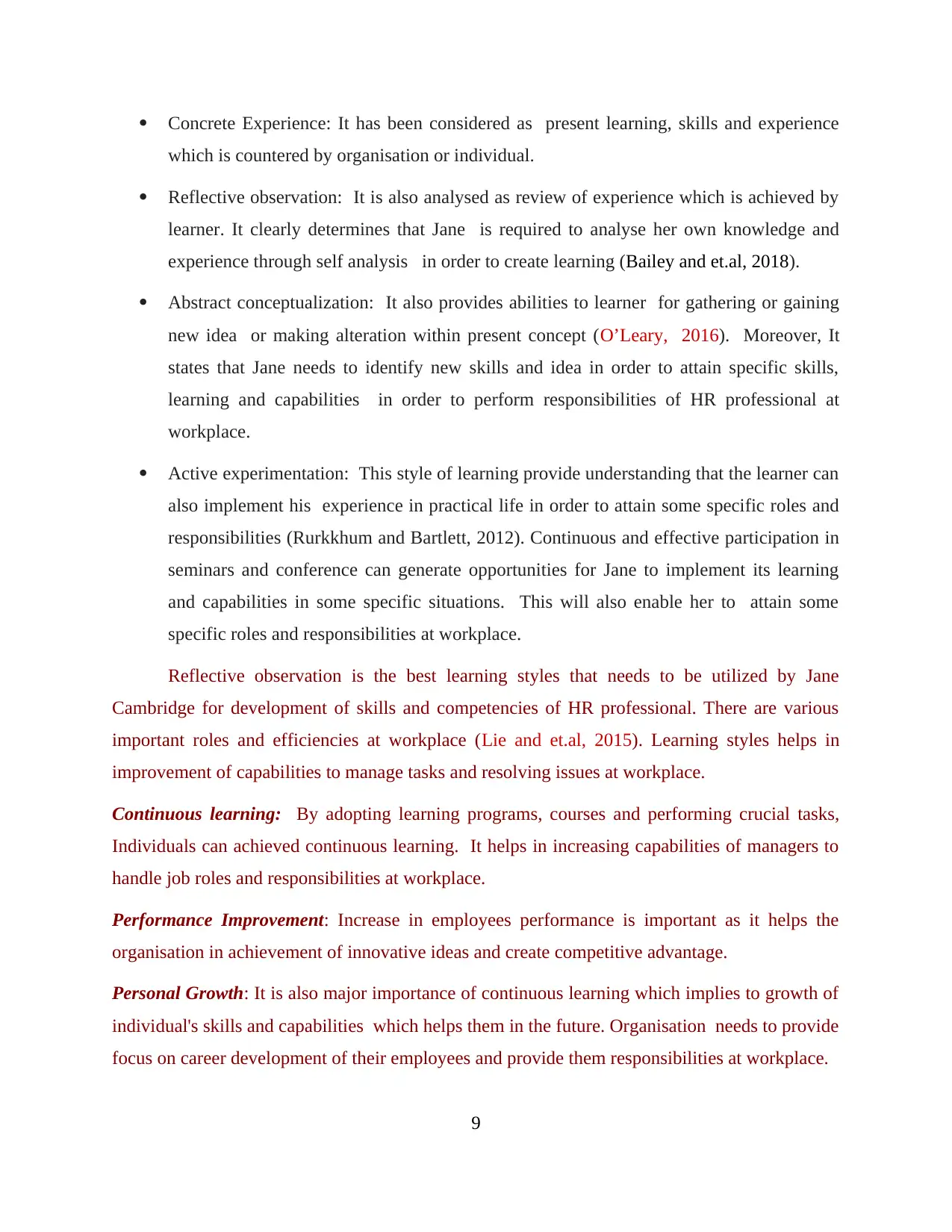
Concrete Experience: It has been considered as present learning, skills and experience
which is countered by organisation or individual.
Reflective observation: It is also analysed as review of experience which is achieved by
learner. It clearly determines that Jane is required to analyse her own knowledge and
experience through self analysis in order to create learning (Bailey and et.al, 2018).
Abstract conceptualization: It also provides abilities to learner for gathering or gaining
new idea or making alteration within present concept (O’Leary, 2016). Moreover, It
states that Jane needs to identify new skills and idea in order to attain specific skills,
learning and capabilities in order to perform responsibilities of HR professional at
workplace.
Active experimentation: This style of learning provide understanding that the learner can
also implement his experience in practical life in order to attain some specific roles and
responsibilities (Rurkkhum and Bartlett, 2012). Continuous and effective participation in
seminars and conference can generate opportunities for Jane to implement its learning
and capabilities in some specific situations. This will also enable her to attain some
specific roles and responsibilities at workplace.
Reflective observation is the best learning styles that needs to be utilized by Jane
Cambridge for development of skills and competencies of HR professional. There are various
important roles and efficiencies at workplace (Lie and et.al, 2015). Learning styles helps in
improvement of capabilities to manage tasks and resolving issues at workplace.
Continuous learning: By adopting learning programs, courses and performing crucial tasks,
Individuals can achieved continuous learning. It helps in increasing capabilities of managers to
handle job roles and responsibilities at workplace.
Performance Improvement: Increase in employees performance is important as it helps the
organisation in achievement of innovative ideas and create competitive advantage.
Personal Growth: It is also major importance of continuous learning which implies to growth of
individual's skills and capabilities which helps them in the future. Organisation needs to provide
focus on career development of their employees and provide them responsibilities at workplace.
9
which is countered by organisation or individual.
Reflective observation: It is also analysed as review of experience which is achieved by
learner. It clearly determines that Jane is required to analyse her own knowledge and
experience through self analysis in order to create learning (Bailey and et.al, 2018).
Abstract conceptualization: It also provides abilities to learner for gathering or gaining
new idea or making alteration within present concept (O’Leary, 2016). Moreover, It
states that Jane needs to identify new skills and idea in order to attain specific skills,
learning and capabilities in order to perform responsibilities of HR professional at
workplace.
Active experimentation: This style of learning provide understanding that the learner can
also implement his experience in practical life in order to attain some specific roles and
responsibilities (Rurkkhum and Bartlett, 2012). Continuous and effective participation in
seminars and conference can generate opportunities for Jane to implement its learning
and capabilities in some specific situations. This will also enable her to attain some
specific roles and responsibilities at workplace.
Reflective observation is the best learning styles that needs to be utilized by Jane
Cambridge for development of skills and competencies of HR professional. There are various
important roles and efficiencies at workplace (Lie and et.al, 2015). Learning styles helps in
improvement of capabilities to manage tasks and resolving issues at workplace.
Continuous learning: By adopting learning programs, courses and performing crucial tasks,
Individuals can achieved continuous learning. It helps in increasing capabilities of managers to
handle job roles and responsibilities at workplace.
Performance Improvement: Increase in employees performance is important as it helps the
organisation in achievement of innovative ideas and create competitive advantage.
Personal Growth: It is also major importance of continuous learning which implies to growth of
individual's skills and capabilities which helps them in the future. Organisation needs to provide
focus on career development of their employees and provide them responsibilities at workplace.
9
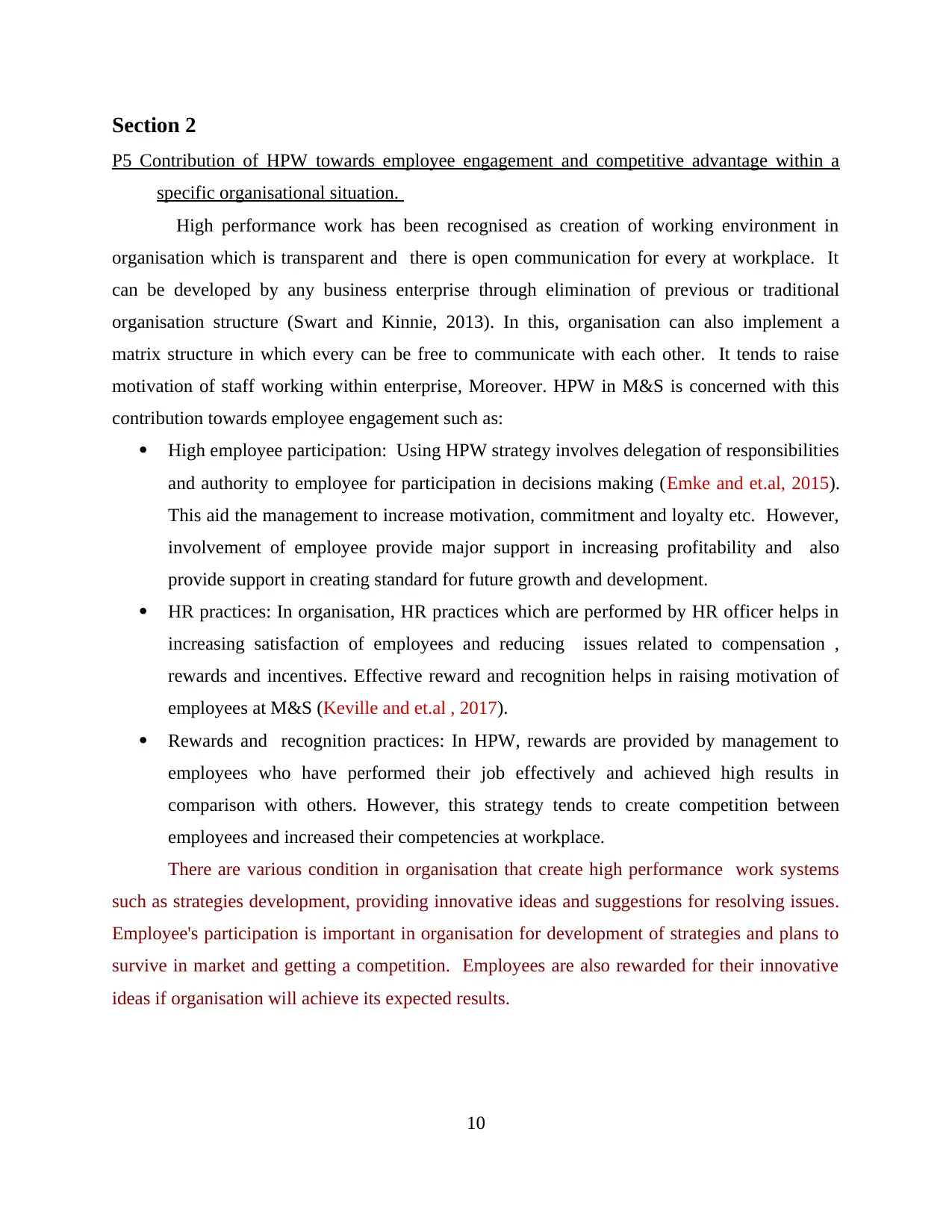
Section 2
P5 Contribution of HPW towards employee engagement and competitive advantage within a
specific organisational situation.
High performance work has been recognised as creation of working environment in
organisation which is transparent and there is open communication for every at workplace. It
can be developed by any business enterprise through elimination of previous or traditional
organisation structure (Swart and Kinnie, 2013). In this, organisation can also implement a
matrix structure in which every can be free to communicate with each other. It tends to raise
motivation of staff working within enterprise, Moreover. HPW in M&S is concerned with this
contribution towards employee engagement such as:
High employee participation: Using HPW strategy involves delegation of responsibilities
and authority to employee for participation in decisions making (Emke and et.al, 2015).
This aid the management to increase motivation, commitment and loyalty etc. However,
involvement of employee provide major support in increasing profitability and also
provide support in creating standard for future growth and development.
HR practices: In organisation, HR practices which are performed by HR officer helps in
increasing satisfaction of employees and reducing issues related to compensation ,
rewards and incentives. Effective reward and recognition helps in raising motivation of
employees at M&S (Keville and et.al , 2017).
Rewards and recognition practices: In HPW, rewards are provided by management to
employees who have performed their job effectively and achieved high results in
comparison with others. However, this strategy tends to create competition between
employees and increased their competencies at workplace.
There are various condition in organisation that create high performance work systems
such as strategies development, providing innovative ideas and suggestions for resolving issues.
Employee's participation is important in organisation for development of strategies and plans to
survive in market and getting a competition. Employees are also rewarded for their innovative
ideas if organisation will achieve its expected results.
10
P5 Contribution of HPW towards employee engagement and competitive advantage within a
specific organisational situation.
High performance work has been recognised as creation of working environment in
organisation which is transparent and there is open communication for every at workplace. It
can be developed by any business enterprise through elimination of previous or traditional
organisation structure (Swart and Kinnie, 2013). In this, organisation can also implement a
matrix structure in which every can be free to communicate with each other. It tends to raise
motivation of staff working within enterprise, Moreover. HPW in M&S is concerned with this
contribution towards employee engagement such as:
High employee participation: Using HPW strategy involves delegation of responsibilities
and authority to employee for participation in decisions making (Emke and et.al, 2015).
This aid the management to increase motivation, commitment and loyalty etc. However,
involvement of employee provide major support in increasing profitability and also
provide support in creating standard for future growth and development.
HR practices: In organisation, HR practices which are performed by HR officer helps in
increasing satisfaction of employees and reducing issues related to compensation ,
rewards and incentives. Effective reward and recognition helps in raising motivation of
employees at M&S (Keville and et.al , 2017).
Rewards and recognition practices: In HPW, rewards are provided by management to
employees who have performed their job effectively and achieved high results in
comparison with others. However, this strategy tends to create competition between
employees and increased their competencies at workplace.
There are various condition in organisation that create high performance work systems
such as strategies development, providing innovative ideas and suggestions for resolving issues.
Employee's participation is important in organisation for development of strategies and plans to
survive in market and getting a competition. Employees are also rewarded for their innovative
ideas if organisation will achieve its expected results.
10
⊘ This is a preview!⊘
Do you want full access?
Subscribe today to unlock all pages.

Trusted by 1+ million students worldwide
1 out of 17
Related Documents
Your All-in-One AI-Powered Toolkit for Academic Success.
+13062052269
info@desklib.com
Available 24*7 on WhatsApp / Email
![[object Object]](/_next/static/media/star-bottom.7253800d.svg)
Unlock your academic potential
Copyright © 2020–2026 A2Z Services. All Rights Reserved. Developed and managed by ZUCOL.





